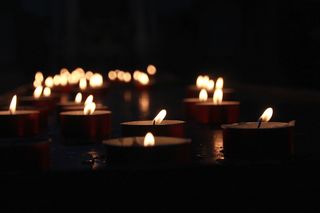
At this time of year, it seems natural to turn inward and to begin a process of self-reflection. The days are becoming darker as we move towards the darkest night of the year. The world’s traditions have marked this time of solstice in a variety of ways. But whatever the method, it is a season when the natural world is supportive of inner reflection. This symbolic and literal understanding of the light has many meanings across traditions. A common practice is to light candles or lamps as a way of representing insight, wisdom, and truth. Often it is understood as welcoming the return of the light at the darkest point in the year.
Returning from the pilgrimage in India with my Danish group of young spiritual enthusiasts, I (Gitte) brought with me a suitcase of candles and incense, determined to keep up my early morning meditation practice. I knew it wouldn’t be as easy as waking up to the sounds of the temple bells and morning arati at the South Indian Ramana ashram, and yet the practice had to be maintained.
As the home destination is Canada and thus in the far north, winter mornings are made very special by their atmosphere of complete darkness and a quietude, which envelops you like a safe cocoon. Even the sky at dawn is unique with the pastel colors and barren trees contrasted against the snowy and icy landscape. Wrapped up in Danish quilts, I quite enjoyed the ritual of lighting white candles and the sandalwood incense while watching the landscape outside go from pitch dark to light. I observed how my mind was naturally drawn inward by the forces of winter nature itself. Even my breath seemed to find a slower pace, not quite ready to be alert and active. It felt quite different from the energy of India where the spirit lifts and turns outward and upward in almost ecstatic reaction to warmth, sounds, and color.
Each season has its own wisdom and in a culture that encourages us to go go go even the most harried and busy among us tend to slow down and even stop at this time of year. Again the fact that nature, at least in the northern latitudes, has gone into a deep sleep evokes the same in us. In her work as a doctor of Chinese medicine Xiaolan Zhao has noted that most of the health problems facing North Americans are related to this unrelenting activity and over scheduling. Amidst all the rushing it is easy to forget that the human body and mind need periods of rest and replenishment.
Because we live in a culture that privileges busyness it can feel like swimming against the tide to insist on carving out time for self-reflection. And the challenges to continuing a meditative or contemplative practice are different depending on the circumstance and culture. For some who have small children, creating a practice might require getting up earlier in the morning. For others, the issue might be explaining to one’s partner the importance of this time for withdrawal from daily worries and cares. These challenges can also be cultural – as Danish and American cultures tend to be extroverted in their orientation emphasizing productivity and sociality. Because of this taking one’s inner life seriously requires determination and commitment.
However, in the holiday season, nature and our cultural rituals offer us a gift of support as even the busiest may stop to light a candle at this time of year. Many of us will admire the beauty of the lights strung up by our neighbors who generously share the beauty of illumination and all that it symbolizes. The cares of the day and of the entire year can fade into the background in these moments in which we welcome the light into our homes and hearts.
References
Xiaolan Zhao (2007) Reflections of the Moon on Water: Healing Women's Bodies and Minds Through Traditional Chinese Medicine.


